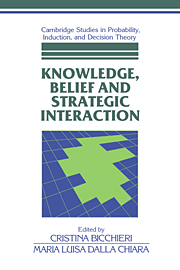Book contents
- Frontmatter
- Contents
- Preface
- List of contributors
- 1 Feasibility
- 2 Elicitation for games
- 3 Equilibrium, common knowledge, and optimal sequential decisions
- 4 Rational choice in the context of ideal games
- 5 Hyperrational games: Concept and resolutions
- 6 Equilibria and the dynamics of rational deliberation
- 7 Tortuous labyrinth: Noncooperative normal-form games between hyperrational players
- 8 On consistency properties of some strongly implementable social choice rules with endogenous agenda formation
- 9 Algorithmic knowledge and game theory
- 10 Possible worlds, counterfactuals, and epistemic operators
- 11 Semantical aspects of quantified modal logic
- 12 Epistemic logic and game theory
- 13 Abstract notions of simultaneous equilibrium and their uses
- 14 Representing facts
- 15 Introduction to metamoral
- 16 The logic of Ulam's games with lies
- 17 The acquisition of common knowledge
- 18 The electronic mail game: Strategic behavior under “almost common knowledge”
- 19 Knowledge-dependent games: Backward induction
- 20 Common knowledge and games with perfect information
- 21 Game solutions and the normal form
- 22 The dynamics of belief systems: Foundations versus coherence theories
- 23 Counterfactuals and a theory of equilibrium in games
12 - Epistemic logic and game theory
Published online by Cambridge University Press: 05 November 2011
- Frontmatter
- Contents
- Preface
- List of contributors
- 1 Feasibility
- 2 Elicitation for games
- 3 Equilibrium, common knowledge, and optimal sequential decisions
- 4 Rational choice in the context of ideal games
- 5 Hyperrational games: Concept and resolutions
- 6 Equilibria and the dynamics of rational deliberation
- 7 Tortuous labyrinth: Noncooperative normal-form games between hyperrational players
- 8 On consistency properties of some strongly implementable social choice rules with endogenous agenda formation
- 9 Algorithmic knowledge and game theory
- 10 Possible worlds, counterfactuals, and epistemic operators
- 11 Semantical aspects of quantified modal logic
- 12 Epistemic logic and game theory
- 13 Abstract notions of simultaneous equilibrium and their uses
- 14 Representing facts
- 15 Introduction to metamoral
- 16 The logic of Ulam's games with lies
- 17 The acquisition of common knowledge
- 18 The electronic mail game: Strategic behavior under “almost common knowledge”
- 19 Knowledge-dependent games: Backward induction
- 20 Common knowledge and games with perfect information
- 21 Game solutions and the normal form
- 22 The dynamics of belief systems: Foundations versus coherence theories
- 23 Counterfactuals and a theory of equilibrium in games
Summary
For sixty years, theoretical economics paid growing attention to agents' expectations, and then to the beliefs that sustain them, in its study of phenomena such as speculation. Now, agents' beliefs regarding their environment constitute a third explanatory principle for decisions, with constraints on their action possibilities and preferences on the social states. The search for generalization led to the introduction of mental representations into game theory, where they are now explicitly modeled in a set formulation that is generally probabilized. Such representations allow a better account of individual behavior under uncertainty, and of equilibria resulting from the conjunction of actions of several players.
For thirty years, cognitive sciences were mainly interested in agents' knowledge in the study of (for instance) their capacity in problem solving. Knowledge was first explored in terms of static organization and later in terms of dynamic revision – that is, when new information becomes available. The search for formalization has recently led to mental representations being axiomatized in a propositional form by epistemic logic, a variety of modal logic. This allows a better account of an agent's knowledge, of others' knowledge, and of the collective improvement of knowledge resulting from the exchange of information between agents.
Although grounded in distinct formal frameworks, the two trends confronted the same questions and yielded more or less similar (and complete) answers. The trends advanced separately at first, but their meeting was unavoidable; each took advantage of the other's results for integrating them into its own problematics.
- Type
- Chapter
- Information
- Knowledge, Belief, and Strategic Interaction , pp. 197 - 226Publisher: Cambridge University PressPrint publication year: 1992



